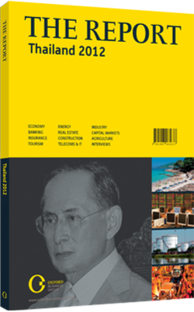Divided stance: Plans to liberalise the brokerage sector are officially confirmed
One of the wildest of wild cards in 2012 has been the question of brokerage reform in Thailand. A plan under implementation early in 2012 to deregulate broker commissions became uncertain after Finance Minister Kittiratt Na-Ranong said the plans to liberalise the sector should be reversed. As of August 2012, it appears that liberalisation has been adopted officially, but implementation of the new policy will be subject to the outcome of internal government debates.
UP IN THE AIR: The future for brokers has been cloudy for several years because plans to boost the number of offerings on Thailand’s capital markets often lead back to the brokers. High costs of trading, despite them being some of the lowest in the region, as well as a lack of sophisticated options have been blamed on the commissions the brokers charge, which previously had been set by regulations that were in the process of being phased out. Amid this uncertain environment, brokers have been consolidation-minded: several recent mergers and acquisitions signal that the brokerage sector could be in for a period of change.
Uncertainty hit a high on March 21, 2012, when Kittiratt said the Stock Exchange of Thailand (SET) and the Securities Exchange Commission (SEC) should reconsider the liberalisation that had been partially completed. The change made it easier to get a brokerage licence, but the key contention has been an end to the regulation of the fees brokers charge.
The set changes that were retracted include a commission for brokers of 0.25% of a trade’s value, or 0.15% for online trades. Those rates were made negotiable for large traders as of 2010 and for retail investors as of 2012. The idea behind the deregulation was that a legal regime in which brokers must compete on price would increase trading activity by lowering the cost of doing so, as well as create an incentive for brokers to compete on services. Wealth-management services based on fees instead of commissions are a growth area, as are proprietary trading desks. The theory proved true in the case of large investors, as the average daily trading value jumped from about $500m a day to $800m in the first quarter of 2010.
DEBATE ONGOING: The crux of the argument is a disagreement over what would actually create greater coverage as well as other services and offerings. One side believes making brokers compete would leave them with less profit to funnel into developing their services, whereas others think deregulating commissions would trigger a consolidation in the market, leaving a smaller roster of larger players who could better afford to expand services. The SEC has confirmed the liberalisation plan and aims to enhance service quality by mandating that brokers’ research departments offer coverage of at least 30 securities, with the minimum threshold rising with market share.
In December 2011, in a move to increase its competitiveness as a response to the liberalisation plan, Phatra Capital and Kiatnakin Bank, which have a combined value of more than $1bn, announced a merger. Phatra is a financial services company that focuses mainly on institutional investors and high-net-worth individuals, and Kiatnakin is the country’s 10th-largest bank by assets, with a focus on retail clients. In November 2011 CIMB Group, the Malaysian financial services conglomerate, bought smaller broker SICCO Securities. That followed a much bigger deal, with Malaysia’s Maybank buying Kim Eng, Thailand’s largest broker by market share.
ALTERNATIVE PATH: Brokers that have direct access to the SET via a seat on the exchange are considered less likely to participate in consolidation, in part because if the SET is reformed, the value of their seats will be unclear. But for the rest of the market, these types of combinations seem likely to be repeated in 2012. One explanation is that foreign financial services firms are eyeing the market and finding few deposit banks in Thailand that are candidates to be bought and that are big enough to offer a foreign banking group enough size to compete with domestic banks. With the banking sector seemingly spoken for, brokerage is an alternative path into Thailand’s financial services market.
You have reached the limit of premium articles you can view for free.
Choose from the options below to purchase print or digital editions of our Reports. You can also purchase a website subscription giving you unlimited access to all of our Reports online for 12 months.
If you have already purchased this Report or have a website subscription, please login to continue.

